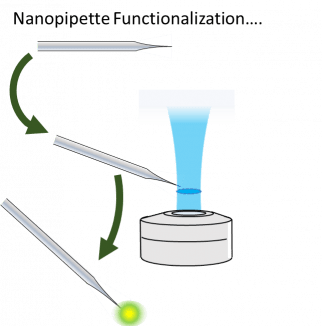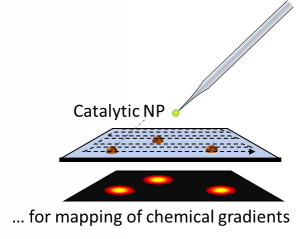M2 internship (PhD possible)
Nanopipette based optical sensors for tracking chemical gradients at the vicinity of catalytic nanoparticles
The development of efficient redox catalysts which can retain activity under continuous operation is a key challenge for the development of stable water splitting schemes. However, most reactions involved in these systems, such as oxygen or hydrogen evolution, dramatically affect the local environment pH. This phenomenon becomes a major source of complexity for understanding the long-term nanocatalyst behavior and the associated deactivation mechanisms. Indeed, being activity dependent, the extent of local pH variation becomes highly heterogeneous, depending on size, shape and nanoenvironment of each nanoobject. As a result, there is a strong demand for the development of non-invasive methodologies, able to probe chemical gradients in the vicinity of individual nano objects in operando conditions.
In this internship, we plan to develop a series of new tools for probing chemical gradients in the vicinity of individual electrocatalytic particles. We propose to use nanopipettes as supports for molecular optical probes, using light activated mechanisms to localize the probes in the apex of the nanopipettes (Fig1). This supported optical approach offers several advantages over existing methodologies: (i) fast time responses, (ii) small size, which be brought within close proximity of the nanoobject surface, (iii) inertness, only minimally affecting with the catalytic system. The work is supported by several preliminary results, including controlled surface modification with attoL precision, demonstration of pipette modification in the microscale, and preliminary demonstration pH dependent emission.
We are looking for a motivated M2 student with a background in physical chemistry or nanofabrication. Knowledge of basic scientific programming and interest for the development of original instrumentation would be a plus, but are not mandatory. The intern will receive dedicated training in several analytical and nanofabrication techniques in the interface between photochemistry and electrochemistry. Upon mutual agreement, the internship may be extended into a PhD targeting mapping of chemical gradients around catalytic nanobjects (Fig.2), for which funding has already been.
For more information contact: Dr Vitor Brasiliense

